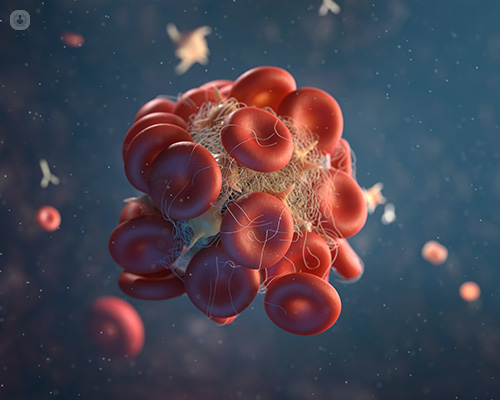Renal artery embolism
Dr Bernhard Klebe - Nephrology
Created on: 01-09-2013
Updated on: 09-28-2023
Edited by: Jay Staniland
What is renal artery embolism?
Renal artery embolism occurs when a blood clot travels from the heart or an aortic plaque to the renal tissue, causing a blockage to the artery carrying blood to the kidney. The area of reduced blood flow in the kidney will often have low perfusion (the passage of fluid), and is then referred to as a renal infarct. In some cases, total obstruction may occur, causing permanent loss of kidney function (kidney failure).
Renal artery embolism is treated by a specialist nephrologist.

Symptoms of renal artery embolism
In some cases, the embolism can have very few symptoms. Often patients can have a history of heart problems prior to developing the embolism.
Other signs, which usually appear suddenly, may be:
- abdominal or back pain
- sudden reduction in urine output
- blood in the urine
- pain in one flank
What are the consequences of renal artery embolism?
The consequences depend on the degree of obstruction: for example, complete obstruction of blood flow may lead to permanent kidney failure. A less severe obstruction may cause the kidney to not work properly.
Can renal artery embolism be prevented?
In a great number of cases, renal artery embolism cannot be prevented. One of the main ways to reduce the risk is to control the diseases related to artherosclerosis (hardening of the arteries). Patients are advised to stop smoking, keep cholesterol and blood pressure controlled and also have a regular heart rhythm.
It should be kept in mind that people with a high risk of developing blood clots may have to take anticoagulants.
What is the treatment?
In some cases, treatment is not necessary because the blood clots improve by themselves over time. If the obstruction is discovered after a few hours or if there is no other functioning kidney, an attempt may be made to open the artery. In such cases, to attempt to unblock the artery and dissolve the clot, using medications that dissolve clots (thrombolytics) are given, restoring blood flow in the artery. In addition, medications that prevent blood clotting (anticoagulants), such as warfarin or apixaban, are given.
In addition, it may be necessary to treat acute kidney failure, for example, with temporary dialysis.
